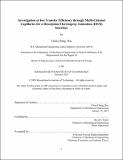Investigation of ion transfer efficiency through multi-channel capillaries for a Desorption Electrospray Ionization (DESI) interface
Author(s)
Hsu, Chun-Cheng,M. Eng.Massachusetts Institute of Technology.
Download1251803670-MIT.pdf (7.874Mb)
Other Contributors
Massachusetts Institute of Technology. Department of Mechanical Engineering.
Advisor
David E. Hardt.
Terms of use
Metadata
Show full item recordAbstract
Desorption Electrospray Ionization (DESI) coupled with mass spectrometry (MS) is an efficient imaging technique for obtaining the spatial distribution of molecular species from a surface. In this study, we experimented with different capillary geometries to maximize the signal intensity of analyte peaks obtained through DESI by improving the temperature uniformity throughout the capillary flow. Multi-channel capillaries were discovered to be more sensitive to temperature and less prone to turbulence under certain conditions when compared to single channel capillaries. A multiple regression analysis reveals the significance of the surface-area-to-volume ratio, inlet-to-outlet area ratio, and the interaction of these main effects with temperature. This study illustrates the complex tradeoff between desolvation and ion loss, thereby providing a general guideline to instrumentation design for the purpose of maximizing signal intensity of the MS.
Description
Thesis: M. Eng. in Advanced Manufacturing and Design, Massachusetts Institute of Technology, Department of Mechanical Engineering, February, 2021 Cataloged from the official PDF of thesis. "February 2021." Includes bibliographical references (page 53).
Date issued
2021Department
Massachusetts Institute of Technology. Department of Mechanical EngineeringPublisher
Massachusetts Institute of Technology
Keywords
Mechanical Engineering.